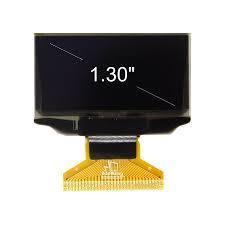
MONOCOLOR OLED
Strengths of OLED
Wide Viewing Angle
Because an OLED becomes self-emissive through organic material, its viewing angle is far wider than an LCD. This wide viewing angle can provide great improvements in a wide variety of product applications. It also offers new design concepts to industrial designers who were before limited by the constraints of traditional LCD
Fast Response Time
A slow response time is one of the main problems with existing LCD technology. Applications, which require animation, are limited to a certain extent with traditional LCD. OLED offers 1,000 timers quicker than in response speed which reduces design constraint of displays.
Low Power Consumption
Because backlight is not required for OLED, the power consumption is lower than a LCD module. This can increase the lifetime of batteries for portable products.
Compact size
Since a backlight is not required for OLED, lightweight and extremely thin displays can be applied to many products, opening up a wide range of new design possibilities.
High Brightness & Contrast
OLED offers a drastically higher level of brightness and contrast as compared to LCD.
The working principle and structure of OLED
The OLED is analogous to that of conventional light-emitting diodes in terms of the working principle. The light emission is through the recombination of electrons and holes from the cathode and anode, respectively. Depending on the device structure, a typical OLED has a hole transport layer (HTL), emitting material layer (EML), and electron transport layer (EML) in between the electrodes. A current injection through the device excites the electrons to higher energy states, and their relaxation to lower states results in light emission with the wavelengths depending on the organic materials and device structure used.
Structure comparision
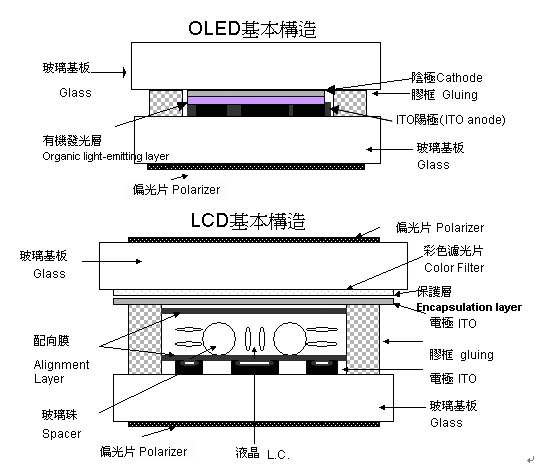
RiTdisplay Corporation
OLED
For OLED (organic light-emitting diode) displays BELIEVE SRL has high quality products.
BELIEVE SRL makes use of partnerships with suppliers who use cutting-edge technologies, innovative research and development, quality certifications and more than 100 approved patents. Among their features, OLEDs have a wide viewing angle, fast response time, low power consumption, compact size with high brightness and contrast.
| Image | Code | Risolution | Luminous Flux[lm/mcd] | Colour Mode | Polarization [h] | Driver | Operating temperature | |
|---|---|---|---|---|---|---|---|---|
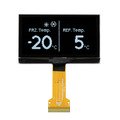
|
P27702
128x64 | 70 Nit | WHITE | 160° | SPD0301 | -40° ~ +70°C
|
128x64 | 70 Nit | WHITE | 160° | SPD0301 | -40° ~ +70°C | DISPLAY OLED 2.4" WHITE 128x64 2000:1 AA 55x28 OUT 61x37mm |
|
P30803
128x64 | 130 Nit | WHITE | 160° | SPD0301 | -40° ~ +70°C
|
128x64 | 130 Nit | WHITE | 160° | SPD0301 | -40° ~ +70°C | DISPLAY OLED 1.54" WHITE 128x64 2000:1 AA 35x18 OUT 42x28 mm | |
|
P35802
128x64 | 50 Nit | WHITE | 160° | SPD0301 | -40° ~ +70°C
|
128x64 | 50 Nit | WHITE | 160° | SPD0301 | -40° ~ +70°C | DISPLAY OLED 2.7" WHITE 128x64 2000:1 AA 62x31 OUT 65x37 | |

|
P27701
128x64 | 70 Nit | YELLOW | 160° | SPD0301 | -40° ~ +70°C
|
128x64 | 70 Nit | YELLOW | 160° | SPD0301 | -40° ~ +70°C | DISPLAY OLED 2.4" YELLOW 128x6 4 2000:1 AA 55/28 OUT 61/37mm |
|
P35801
128x64 | 90 Nit | YELLOW | 160° | SPD0301 | -40° ~ +70°C
|
128x64 | 90 Nit | YELLOW | 160° | SPD0301 | -40° ~ +70°C | DISPLAY OLED 2.7" YELLOW 128x64 2000:1 AA 62x31 OUT 65x37mm | |

|
P24803
128x32 | 350 Nit | WHITE | 160° | SSD1307 | -40° ~ +70°C
|
128x32 | 350 Nit | WHITE | 160° | SSD1307 | -40° ~ +70°C | DISPLAY OLED 0.9" WHITE 128x32 2000:1 AA 26x6 OUT 30x12mm |
|
P31103
96x32 | 150 Nit | WHITE | 160° | SSD1316Z2 | -40° ~ +70°C
|
96x32 | 150 Nit | WHITE | 160° | SSD1316Z2 | -40° ~ +70°C | DISPLAY OLED 0.9" WHITE 96x32 2000:1 AA 21x6 OUT 29x10mm | |
|
P32401
96x16 | 1200 Nit | WHITE | 160° | LD7054 | -40° ~ +70°C
|
96x16 | 1200 Nit | WHITE | 160° | LD7054 | -40° ~ +70°C | DISPLAY OLED 0.7" WHITE 96x16 2000:1 AA 18x4 OUT 24x8mm | |
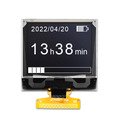
|
P22102
128x128 | 90 Nit | WHITE | 160° | SSD1327 | -40° ~ +70°C
|
128x128 | 90 Nit | WHITE | 160° | SSD1327 | -40° ~ +70°C | DISPLAY OLED 1.5" WHITE 128x128 2000:1 AA 27x27 OUT 34x37mm |
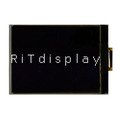
|
P36801
128x160 | 350 Nit | WHITE | 160° | SH1108 | -40° ~ +70°C
|
128x160 | 350 Nit | WHITE | 160° | SH1108 | -40° ~ +70°C | DISPLAY OLED 1.92" WHITE 128x160 2000:1 32.9x118.4x1.22mm |